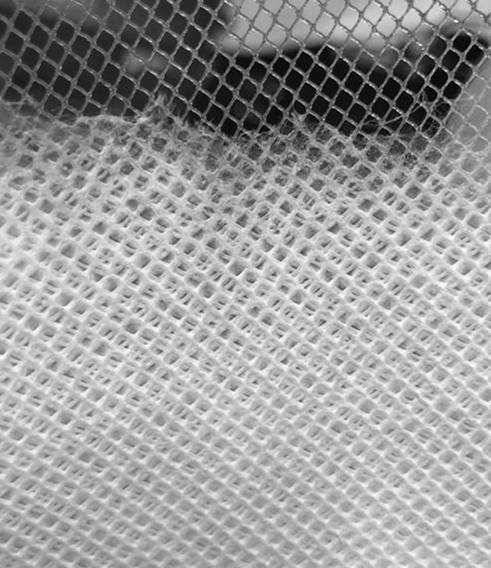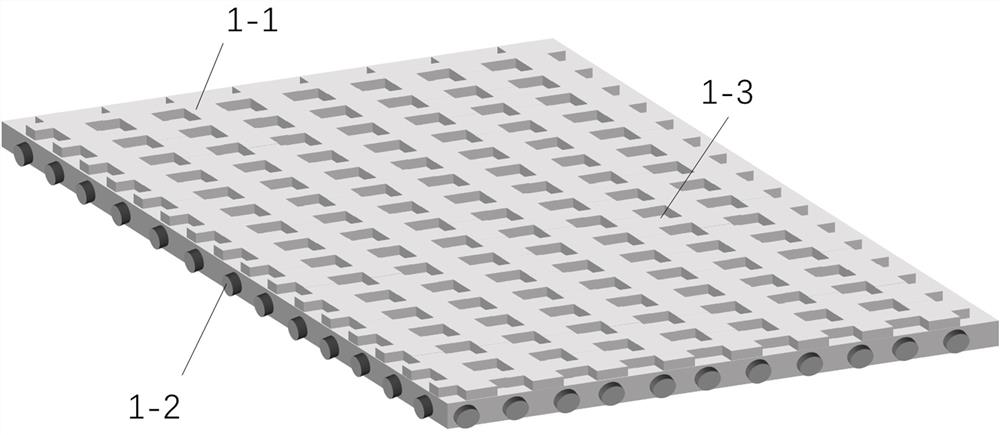Polylactic acid elastic non-woven material beneficial to tissue regeneration and preparation method thereof
A technology of tissue regeneration and polylactic acid, which is applied in tissue regeneration, non-woven fabrics, textiles and papermaking, etc., can solve the problem of insufficient safety and environmental protection in industrialized production, influence on fiber microstructure and use effect, and solvent residue in nanometer fiber webs To achieve the effect of promoting wound healing and characteristic treatment, facilitating tissue fusion, and not irritating the skin
- Summary
- Abstract
- Description
- Claims
- Application Information
AI Technical Summary
Problems solved by technology
Method used
Image
Examples
Embodiment 1
[0054] The preparation method of the polylactic acid elastic non-woven material beneficial to tissue regeneration, the steps are as follows:
[0055] (1) Preparation process of polyolefin elastic filament skeleton:
[0056] First, polyolefin elastic filaments with an average diameter of 100 μm and a circular cross-section were selected for antibacterial treatment.
[0057] The selected bio-based antibacterial material is chitosan solution, and a certain amount of chitosan is dissolved in citric acid with a mass fraction of 20% to form a chitosan solution with a mass fraction of 1%.
[0058] First, the prepared polyolefin filaments are treated with low-temperature plasma to introduce hydroxyl groups (—COOH) on the polyolefin filaments, and the hydroxyl groups can combine with the amino groups in chitosan, thereby fixing chitosan and giving it excellent antibacterial properties. Subsequently immerse it in the chitosan solution for 24 hours at 4°C, take it out and dry it; the a...
Embodiment 2
[0080] The preparation method of the polylactic acid elastic nonwoven material that is beneficial to tissue regeneration, the steps are as follows: the difference between this embodiment and embodiment 1 is that the average diameter of the polyolefin elastic filament used is 180 μm; °C, the average diameter of polylactic acid / polycaprolactone nano-micron fibers is 1.8 μm. In addition, adopting the same method as in Example 1 to obtain an areal density of 107.8 g / m 2 A polylactic acid elastic non-woven material that is beneficial to tissue regeneration, its characteristic test is shown in Table 1.
Embodiment 3
[0082] The preparation method of the polylactic acid elastic nonwoven material beneficial to tissue regeneration, the steps are as follows: the difference between this embodiment and embodiment 1 is that the functional polymer used is polyglycolide, and the average diameter of the polyolefin elastic filament used is 130 μm , the main component of the antibacterial layer used is chitosan / hyaluronic acid; at the same time, by increasing the temperature of the melt-blown die head to 230°C, increase the fan speed by 65r. min -1 , to achieve an average diameter of polylactic acid / polyglycolide nano-microfibers of 1.4 μm. In addition, adopting the same method as in Example 1 to obtain an areal density of 51.6 g / m 2 A polylactic acid elastic non-woven material that is beneficial to tissue regeneration, its characteristic test is shown in Table 1.
PUM
| Property | Measurement | Unit |
|---|---|---|
| Thickness | aaaaa | aaaaa |
| Length | aaaaa | aaaaa |
| Areal density | aaaaa | aaaaa |
Abstract
Description
Claims
Application Information
 Login to View More
Login to View More - R&D
- Intellectual Property
- Life Sciences
- Materials
- Tech Scout
- Unparalleled Data Quality
- Higher Quality Content
- 60% Fewer Hallucinations
Browse by: Latest US Patents, China's latest patents, Technical Efficacy Thesaurus, Application Domain, Technology Topic, Popular Technical Reports.
© 2025 PatSnap. All rights reserved.Legal|Privacy policy|Modern Slavery Act Transparency Statement|Sitemap|About US| Contact US: help@patsnap.com



